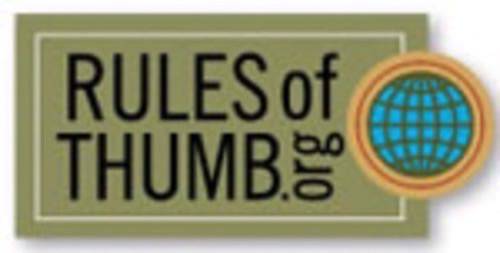You can stay in control of virtually any situation as long as you know where your towel is. That’s a good rule of thumb to remember for anyone planet hopping around the universe. But how do you know how to evaluate the programmer for your next project? Or know if that girl (or guy) at the end of the bar likes you? Don’t panic. Terrestrial travelers can consult a new web site called Rules of Thumb that is attempting to catalogue all those nifty bits of knowledge that fall somewhere between adage and old wives tale. You know, like, when the cows are sitting down, expect rain in the near future.

“A rule of thumb is a homemade recipe for making a guess,” says the Rules of Thumb site. “It is an easy-to-remember guide that falls somewhere between a mathematical formula and a shot in the dark.”
The site is the brainchild of Tom Parker, author of — you guessed it — “Rules of Thumb” (and “Rules of Thumb 2” and “Never Trust a Calm Dog”), an out of print collection of little household sayings that was published in the mid 1980s. Parker, who is a contributing writer for MAKE Magazine and works at Cornell University as a project manager, did the late night TV and news circuit with his books in the 80s and 90s, appearing on Letterman, Carson, and the CBS Evening News.
Now the the books are no longer in print, Parker decided to try bringing his collection of rules of thumb to the web and launched his web site a little over two weeks ago with the ambitious goal “to collect every rule of thumb on earth at one handy web address.” It has since signed up over 900 members and lists hundreds of rules of thumb based in part on his previously published work.
Unlike his traditionally published books, Parker is putting editorial control over the Rules of Thumb website in the hands of the crowd. Anyone can contribute a new rule, but other users will have the ability to vote up or down whether new rules make it into the main database. Once in the DB, users can rate and review rules, which Parker tells us allows the site to employ “a Darwinian weeding mechanism which will let the content improve in value over time.”
So what does a rule of thumb look like? Well, this one states that, “One excellent programmer will typically contribute as much to a project as nine mediocre programmers.” Well, probably — that’s more or less what our own Alex Iskold argued in October. And this rule tells us that, “If you are talking to someone that you like, when you are in a bright room, look in their eyes, if their pupils are dilated (big), then its possible they like you.” Or, maybe they just ate some tainted meat.
If those rules sound more like things you might hear over the water cooler rather than hard and true facts, that’s because they are. As Parker says, “a rule of thumb is a highly personal thing.” These are things that probably should not be taken as gospel, but they are part of the pantheon of human knowledge, and Parker’s goal is to record it all in a modern Hitchhiker’s Guide-esque online tome.

















